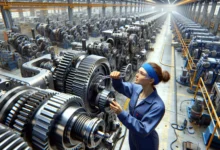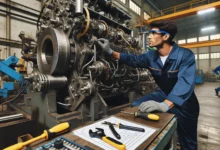Industrial Insurance Explained
Advertisement
Introduction
Industrial insurance is a crucial aspect of risk management for businesses involved in manufacturing, construction, and other industrial activities. This type of insurance provides coverage for various risks and liabilities that can arise in industrial settings. In this article, we will delve into the details of industrial insurance and explain how it works to protect businesses and their employees.
Industrial insurance is designed to provide financial protection to businesses in the industrial sector. It covers a wide range of risks, including property damage, liability claims, worker injuries, and equipment breakdowns. By having the right industrial insurance coverage in place, businesses can safeguard their assets and ensure their continued operations in the event of unforeseen circumstances.
Industrial insurance policies are tailored to the specific needs of each business, taking into account the industry, size, and location of the company. These policies typically include various types of coverage, such as property insurance, liability insurance, workers’ compensation, and business interruption insurance. By having a comprehensive industrial insurance policy, businesses can mitigate the financial risks associated with running industrial operations.
Although industrial insurance provides valuable protection for businesses, it also has its strengths and weaknesses. In the following sections, we will outline the key advantages and disadvantages of industrial insurance explained in detail.
Strengths of Industrial Insurance
One of the main strengths of industrial insurance is its ability to provide financial protection against unforeseen events. By having the right insurance coverage in place, businesses can avoid significant financial losses resulting from property damage, liability claims, or worker injuries. This can help businesses maintain their financial stability and continue their operations without interruption.
Another strength of industrial insurance is its flexibility in terms of coverage options. Businesses can choose from a wide range of insurance policies and customize them to meet their specific needs. Whether a business is looking for property insurance, liability insurance, or workers’ compensation coverage, there are diverse options available to suit different industrial sectors.
Industrial insurance also offers peace of mind to business owners and employees. By knowing that they are protected by insurance, businesses can focus on their core operations without worrying about potential risks. This can lead to increased productivity, efficiency, and overall business success.
Additionally, industrial insurance can help businesses comply with legal requirements and industry regulations. Many industrial sectors have specific insurance requirements that businesses must meet to operate legally. By having the right insurance coverage in place, businesses can ensure compliance with these regulations and avoid potential penalties or fines.
Furthermore, industrial insurance can enhance the reputation and credibility of a business. By demonstrating that they have comprehensive insurance coverage, businesses can build trust with clients, partners, and other stakeholders. This can help businesses attract new customers, secure contracts, and maintain strong relationships within the industry.
Moreover, industrial insurance can provide a competitive advantage to businesses. By having robust insurance coverage in place, businesses can differentiate themselves from competitors and stand out in the market. This can give businesses a competitive edge and position them for long-term success and growth.
Finally, industrial insurance can offer financial security to businesses during challenging times. In the event of a disaster or crisis, such as a fire, flood, or lawsuit, insurance can provide the necessary funds to cover losses and expenses. This can help businesses recover quickly and resume operations without suffering significant financial setbacks.
Weaknesses of Industrial Insurance
Despite its many strengths, industrial insurance also has some weaknesses that businesses should be aware of. One of the main weaknesses of industrial insurance is the cost. Depending on the coverage options and limits chosen, industrial insurance can be expensive for businesses, especially small and medium-sized enterprises with limited financial resources.
Another weakness of industrial insurance is the potential for coverage gaps. Despite having insurance in place, businesses may discover that certain risks or liabilities are not adequately covered by their policy. This can leave businesses vulnerable to financial losses in specific situations that are not explicitly addressed in their insurance policy.
Industrial insurance policies also have exclusions that can limit the coverage provided to businesses. These exclusions may include specific events, perils, or circumstances that are not covered by the insurance policy. Businesses must carefully review their insurance policy to understand the exclusions and any limitations that may apply to their coverage.
Furthermore, industrial insurance claims processes can be complex and time-consuming. In the event of a claim, businesses may need to provide extensive documentation, evidence, and proof of loss to receive compensation from their insurance provider. This can be challenging for businesses, especially during periods of crisis or emergency.
Industrial insurance premiums can also increase over time due to various factors, such as claims history, industry risks, and market conditions. Businesses must be prepared for potential premium hikes and budget accordingly to maintain their insurance coverage. Failure to pay premiums on time can lead to policy cancellations and gaps in coverage.
Moreover, industrial insurance may not cover all risks and liabilities faced by businesses. Depending on the policy terms and conditions, certain events or perils may be excluded from coverage. Businesses must assess their insurance needs and consider additional coverage options to address any gaps in their insurance policy.
Finally, industrial insurance relies on the financial stability of insurance providers. In the event of an insurance company’s insolvency or bankruptcy, businesses may not receive the compensation they are entitled to under their policy. Businesses should research and choose reputable insurance providers with a strong financial standing to minimize this risk.
Industrial Insurance Explained Table
| Category | Description |
|---|---|
| Property Insurance | Covers damage to buildings, equipment, and inventory |
| Liability Insurance | Protects against lawsuits and claims from third parties |
| Workers’ Compensation | Provides benefits to employees injured on the job |
| Business Interruption Insurance | Compensates for lost income during business disruptions |
Frequently Asked Questions (FAQs) about Industrial Insurance
1. What is industrial insurance?
Industrial insurance is a type of insurance designed to protect businesses in the industrial sector from various risks, such as property damage, liability claims, and worker injuries.
2. Why do businesses need industrial insurance?
Businesses need industrial insurance to mitigate financial risks, comply with legal requirements, protect their assets, and ensure business continuity in the event of unforeseen circumstances.
3. What types of coverage are included in industrial insurance?
Industrial insurance typically includes property insurance, liability insurance, workers’ compensation, and business interruption insurance to address different risks faced by businesses in the industrial sector.
4. How can businesses tailor their industrial insurance coverage?
Businesses can customize their industrial insurance coverage by choosing specific policies, coverage limits, deductibles, and additional coverage options to suit their unique needs and risk exposures.
5. What are the key advantages of industrial insurance?
The key advantages of industrial insurance include financial protection, flexibility in coverage options, peace of mind, compliance with regulations, reputational benefits, competitive advantage, and financial security during crises.
6. What are the main weaknesses of industrial insurance?
The main weaknesses of industrial insurance include costs, coverage gaps, exclusions, complex claims processes, premium increases, limitations in coverage, and reliance on insurance providers’ financial stability.
7. How can businesses choose the right industrial insurance provider?
Businesses can choose the right industrial insurance provider by conducting research, evaluating insurance offerings, comparing quotes, checking customer reviews, and assessing the financial strength and reputation of insurance companies.
Conclusion
Industrial insurance is a vital component of risk management for businesses in the industrial sector. By understanding the strengths and weaknesses of industrial insurance, businesses can make informed decisions about their insurance needs and coverage options. While industrial insurance provides valuable protection against various risks, businesses must also be aware of its limitations and potential pitfalls. By carefully selecting the right insurance coverage, businesses can safeguard their operations, assets, and employees from unforeseen events and challenges. It is essential for businesses to regularly review and update their industrial insurance policies to ensure they have adequate coverage and protection.
In conclusion, industrial insurance plays a crucial role in ensuring the resilience and continuity of industrial businesses. By taking proactive steps to secure the right insurance coverage, businesses can navigate the risks and uncertainties of the industrial sector with confidence and peace of mind. Industrial insurance explained in this article serves as a guide for businesses to understand the importance, benefits, and considerations of industrial insurance in protecting their operations and assets.
Disclaimer
The content provided in this article is for informational purposes only and should not be construed as legal, financial, or insurance advice. Readers are advised to consult with qualified professionals or insurance agents to discuss their specific insurance needs and coverage options. The information presented may vary based on individual circumstances and insurance policies. The accuracy and completeness of the information cannot be guaranteed, and readers are encouraged to conduct their research and due diligence before making any insurance decisions.









